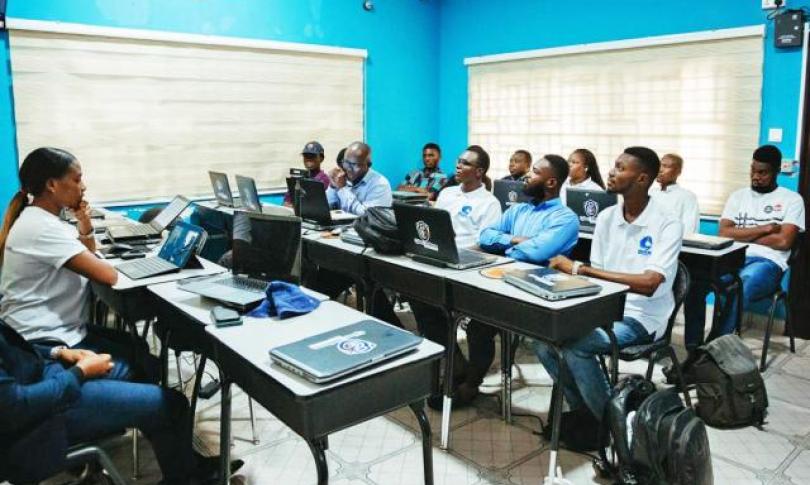
The first-ever Science Journalists Forum took place on November 14, 2024, in Accra, Ghana, marking a significant moment in the evolution of science communication in the country. Organized by Science Journalism Ghana and spearheaded by its founder, Jessica Ahedor, the event attracted 36 participants, including journalists, scientists, policymakers, and tech experts. The theme for the forum, “Science Journalism in West Africa in the Era of AI and Misinformation,” underscored the urgent need to address challenges and leverage opportunities in the modern media landscape.
Opening Session
The program began with a warm welcome from the event chair, Madam Sheila Gbormittah, who acknowledged the gaps in Ghana’s media landscape regarding science communication.
“Science journalism in Ghana has long been overlooked, but today marks the beginning of a new chapter,” she said. She commended Jessica Ahedor for her vision and leadership, stating, “Jessica has chosen a path that will not only redefine journalism in Ghana but also inspire the next generation of storytellers.”
Madam Gbormittah’s remarks set a reflective and hopeful tone for the day, laying the foundation for the discussions that followed.
Keynote Address: A Call for Science Investment
The keynote speaker, Professor Conny Aerts, a globally renowned astrophysicist, delivered an inspiring address emphasizing the need for investment in science journalism and science-focused policies.
“No country has ever been great without investing in science and technology,” she stated emphatically. She called on the Ghanaian government to adopt policies that promote innovation and empower journalists to communicate science effectively. Professor Aerts highlighted that a strong foundation in science journalism is essential for driving public understanding, policy-making, and national progress.
Her address received resounding applause from the participants, many of whom echoed her sentiments during later discussions.
Panel Discussions: AI and the Ethics of Journalism
The program featured two panel sessions that explored the intersection of artificial intelligence (AI) and journalism.
Panel 1: Ethical Use of AI in Journalism
Moderated by South African science journalist Munyaradzi Makoni, the panel included Jonathan Kennedy Sowah, an experienced journalist, and the founder of INOVTECH Ghana. They discussed the ethical implications of using AI in newsrooms.
Makoni highlighted, “AI is a double-edged sword—it can enhance storytelling, but it can also spread misinformation if not used responsibly.”
Sowah added, “Journalists must approach AI with caution and always prioritize credibility and accuracy in their reporting.”
The discussions underscored the importance of ethical frameworks to guide the adoption of AI in journalism, particularly in the context of science reporting.
Panel 2: Practical AI Tools for Science Writing
In a highly interactive session, Mr. Joshua Opoku Agyemang, President of IoT Africa, introduced participants to various AI tools that can enhance science journalism. He provided practical demonstrations on how these tools can simplify data analysis and storytelling.
“These tools are not here to replace journalists but to make their work more efficient and impactful,” he said, encouraging participants to embrace technology to stay ahead in the field.
Complementing this session, Mr. Julius Atokple, CEO of Advanz Digital Agency, addressed the unique challenges of AI adoption in Africa.
“Access to technology, infrastructure, and digital literacy remain significant barriers, but they are not insurmountable. With the right strategies, Africa can harness AI to transform its journalism industry,” Atokple explained.
Participant Engagement and Feedback
The forum was designed to encourage active engagement, and the 36 participants were enthusiastic in sharing their perspectives and learning from the experts. Breakout sessions provided opportunities for journalists to collaborate on story ideas and explore the practical application of AI tools introduced during the event.
One participant remarked, “This forum has been eye-opening. It’s given me new tools and a fresh perspective on how to communicate science effectively.”
Closing Remarks
Jessica Ahedor, the founder of Science Journalism Ghana, delivered the closing remarks, expressing gratitude to all participants and speakers for making the event a success.
“This is not just a one-day event—it is the start of a movement,” she said. “Science Journalism Ghana is committed to empowering journalists with the tools, knowledge, and networks needed to bridge the gap between science and society.”
Conclusion
The inaugural Science Journalists Forum was a resounding success, creating a platform for dialogue, learning, and collaboration. With its mix of keynote addresses, panel discussions, and practical sessions, the event provided valuable insights and tools for journalists to navigate the rapidly evolving media landscape.
The 36 participants left the forum inspired and equipped to tackle the challenges of misinformation and leverage AI to tell compelling science stories. This event has set the stage for a brighter future for science journalism in Ghana, with plans to make it an annual gathering.
As Ghana embarks on this journey to strengthen science communication, the Science Journalists Forum will undoubtedly serve as a cornerstone for building a scientifically informed and empowered society.
